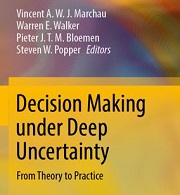 | Reference
Bloemen P.J.T.M., Hammer F., van der Vlist M.J., Grinwis P., van Alphen J. (2019) DMDU into Practice: Adaptive Delta Management in The Netherlands. In: Marchau V., Walker W., Bloemen P., Popper S. (eds) Decision Making under Deep Uncertainty. Springer, Cham. DOI
https://doi.org/10.1007/978-3-030-05252-2_14 |
Abstract
- Generic rules on how to organize the process of putting DMDU approaches and tools into actual practice are currently lacking.
- Lessons can be drawn from the Adaptive Delta Management (ADM) approach used in the Dutch Delta programme on flood risk management, freshwater availability, and spatial adaptation.
- In the context of putting a DMDU approach into practice, three consecutive phases can be distinguished, with specific aspects that require extra attention: (I) Directly following the political decision to actually start a long-term programme that will deal with the deeply uncertain issue, the programme itself should be designed to keep political involvement “at arm’s length”. (II) Strategy development requires a narrative that explains how uncertainty is dealt with; that narrative should match the specific societal and political context of the moment. (III) Implementing adaptive strategies requires organizational arrangements for systematically accommodating adjustments, a monitoring system for timely detecting of signals, and a decision-making process that links directly to its output.
- On a more general level, it can be concluded that DMDU approaches, such as described in the scientific literature, can profit from feedback—feedback from other researchers and feedback from practitioners. Organizing the latter, an instrumental element of “coproduction of knowledge”, might be more time consuming, but is likely to be very effective.